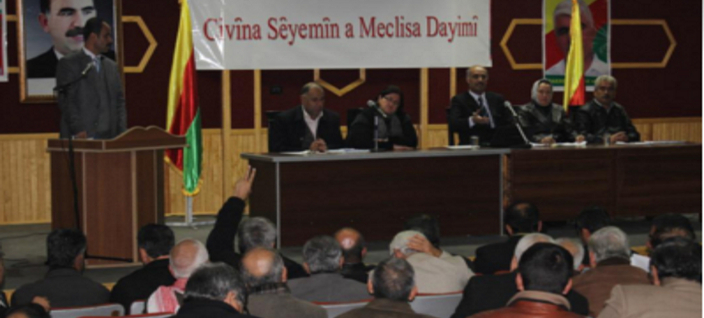WEST KURDISTAN, — On 28 December People’s Council of West Kurdistan held its third meeting. In the meeting the situation of Syria and Western Kurdistan wهs discussed in detail and a civil code issued for liberated areas of Western Kurdistan.
People’s Council of West Kurdistan that was established after the general election in January 2011, on 28 December 2012 in the city of Amuda held its third meeting.
In the first day of this meeting, the situation of Syria and Western Kurdistan and the regional autonomy, security, a system for prisons and courts were discussed in detail.
In this meeting, Abdu Al-Salam Ahmed, the co-leader of People’s Council of West Kurdistan condemned the massacre of Roboski and the efforts of Turkey in covering up this crime.
Ahmed regarding the situation of Syria and Western Kurdistan said: “our movement from the beginning of the revolution successfully chose third way and as the result of our policy we did not allow the civil war to spill over into Western Kurdistan”.
“Turkey in its efforts to destabilize Western Kurdistan brought a group of mercenaries and Jihadists to occupy the city of Seri Kanye in Western Kurdistan. But they encountered with the heroic resistance of People’s Defence Units (YPG) and were defeated and all the efforts of Turkish government failed”, the co-leader of People’s Council of West Kurdistan said.
“People’s Council of West Kurdistan while organizing itself, prioritized the unity of Kurds and the national cooperation. The High Kurdish Council is the result of these efforts”, Ahmed stated.
At the second day of this meeting, the situation of Kurdish women in Western Kurdistan was discussed. The members of People’s Council of West Kurdistan issued a civil code about women based on freedom for women and society.
According to this civil code:
- Under no circumstances can two persons under 18 years marry each other.
- Women can choose their husband freely and forced marriage is prohibited.
- The exchange of women in marriage is prohibited.
- Polygamy is prohibited
- The dowry is prohibited; instead both husband and wife are responsible for earning the necessities of life.
- The mother should maintain her child till 15 years old, and after the child turns to 15 years, the child can choose her/his fate
- Men and women are equal in inheritance.
- Women and men have equal rights in working and making decisions.
